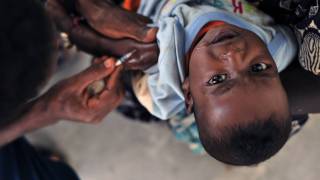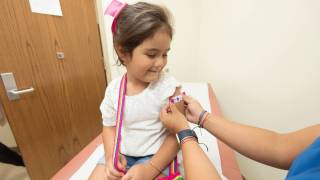Have You Considered a 3rd MMR Dose?

In response to the expanding number of mumps outbreaks, the Centers for Disease Control and Prevention (CDC) released new guidance on when the 3rd dose of mumps vaccine is appropriate.
This new CDC guidance did not recommend a 3rd dose of mumps-containing vaccine outside of an ongoing mumps outbreak.
But, the CDC’s panel of experts from 9 national organizations found that there is ample data to recommend routine use of the third dose of mumps-containing vaccine to shorten the duration of an ongoing mumps outbreak.
And, people should use a risk-based matrix from the CDC to identify at-risk communities and individuals.
This CDC panel's expanded vaccination recommendation is in response to the number of mumps outbreaks in the USA.
From 2012-’15, a total of 47 outbreaks were reported. In contrast, 88 mumps outbreaks were reported during 2017.
Moreover, it appears the number of mumps outbreaks during 2018 may be greater.
The mumps virus is spread from person to person through respiratory secretions, which makes college-lifestyles ideal settings to create an outbreak.
During 2018, a large number of colleges have reported mumps outbreaks.
Various colleges have reported mumps cases, such as Cincinnati, Emory, James Madison University, Michigan, Northern Colorado, Northeastern University, Oklahoma University, Penn State, TCU, Texas State and Western Illinois University.
These mumps outbreaks have occurred despite a large number of infected individuals having already received the recommended 2-dose MMR vaccination series.
Since the reason for the increase in mumps outbreaks is unclear, the CDC took action and issued their new 3rd dose recommendation.
One potential cause of these mumps outbreaks could be ‘waning-immunization.’
A previous study from the Harvard T.H. Chan School of Public Health found that vaccine-derived immune protection against mumps persists an average for about 27 years, after the last dose.
These Harvard researchers estimated that 25 percent of people vaccinated against mumps may lose protection within 7.9 years, 50 percent within 19 years, and 75 percent within 38 years.
Another reason for mumps outbreaks could be under-vaccinations by international visitors to the USA.
As an example, the Honduras health authority reported over 3 million residents have never been immunized against the mumps virus.
According to the American Academy of Pediatrics, pediatric healthcare professionals should be aware that children and young adults involved in mumps outbreaks may come to them after being notified that they should receive the 3rd dose of mumps-containing vaccine.
The CDC recommends all children get 2-doses of MMR vaccine, starting with the first dose at 12 through 15 months of age, and the second dose at 4 through 6 years of age.
Children can receive the second dose earlier as long as it is at least 28 days after the first dose, says the CDC.
MMR vaccine is given later than some other childhood vaccines because antibodies transferred from the mother to the baby can provide some protection from disease and make the MMR vaccine less effective until about 1 year of age.
Additionally, the CDC suggests international travelers ensure their mumps immunizations are appropriate when visiting various countries.
The mumps virus is characterized by swelling of salivary, or parotid, glands. Accompanying symptoms include fever, headache, fatigue, and myalgias.
The most well-known complication of mumps infection is swelling of the testicles, which may occur in up to one-third of post-pubertal males but rarely can lead to long-term fertility problems.
In the USA, most pharmacies offer mumps vaccination services.
To schedule an appointment with a pharmacist visit this site.
The CDC Vaccine Price List provides private sector vaccine prices for general information.
Vaccine discounts can be found here.
Vaccines, like any medicine, can have side effects, says the CDC. You are encouraged to report negative side effects of vaccines to the FDA or CDC.
Our Trust Standards: Medical Advisory Committee
- CDC guidance for public health authorities on use of a 3rd dose of MMR vaccine during mumps outbreaks
- Measles, Mumps, and Rubella (MMR) Vaccination: What Everyone Should Know
- Waning Immunity Is Associated with Periodic Large Outbreaks of Mumps: A Mathematical Modeling Study of Scottish Data
- Honduras is a Central American Hot-Spot for Dengue & Mumps
- Elite Universities Not Immune to Mumps Outbreaks

























